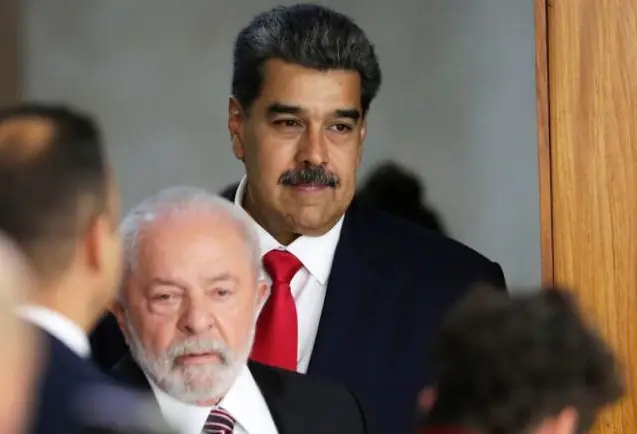The crisis between Brazil and Venezuela is not a recent development. It dates back to 2015 when a delegation of Brazilian parliamentarians visited opposition leaders to the government of Nicolás Maduro. The ideological divergences within Brazil’s power dynamics—initially between the Brazilian Social Democracy Party (PSDB) and the Workers’ Party (PT), and later between Bolsonaro’s faction and the so-called progressive political camp—transformed Venezuela into a symbolic “example” of what Brazil could become under leftist rule. Venezuela thus became a political battleground for Brazil’s internal disputes. Supporting opposition leaders against Hugo Chávez and Nicolás Maduro became an identity marker for Brazil’s right-wing forces.
Under Bolsonaro’s administration, not only was Juan Guaidó recognized as Venezuela’s legitimate president, but all Venezuelan diplomats were expelled, the Venezuelan Embassy in Brasília was stormed, and a Venezuelan citizen not appointed by Maduro’s government was formally recognized—a clear violation of multiple articles of the Vienna Conventions (1961 and 1963).
When Lula returned to power in 2023, many anticipated a revival of the Lula-Chávez era bilateral relations. However, this expectation fell short, not only due to the vastly different context but also because Brazilian diplomacy acknowledged the political challenges of Nicolás Maduro, including his failure to meet reasonable international requests, such as providing transparent records for the 2024 elections. This diplomatic tension culminated in Brazil’s veto of Venezuela’s membership in the BRICS bloc and Venezuela’s refusal to recognize Brazil’s oversight of Argentina’s Embassy in Caracas.
The deterioration of bilateral relations between Brazil and Venezuela is deeply concerning. Venezuela, home to the world’s largest proven oil reserves and a founding member of OPEC, has the potential to help reduce fuel costs for Brazilians and support Brazil’s electrical grid. Historically, only the residents of Roraima have fully reaped the benefits of the strategic Brazil-Venezuela partnership.
What to expect from Brazil-Venezuela relations in 2025?
The Lula administration decided to act as guarantor of Venezuela’s most recent elections, though the underlying motivations for this decision remain unclear. Whether the move was an attempt to reclaim regional leadership or mediate between Venezuela and the White House—which has long pursued the dismantling of the Chávez regime through questionable diplomatic tactics—Brazil’s gamble proved ineffective.
The U.S. government sidelined Brazil, while Maduro’s administration clashed with Brasília over its lack of clear objectives. Brazil presented no concrete outcomes, and its proposals were largely ignored by Venezuela. Moreover, the veto of Venezuela’s BRICS membership further showcased Brazil’s inconsistent stance, undermining both bilateral and multilateral efforts.
Brazil’s foreign policy struggles to articulate a coherent strategy concerning Venezuela, creating uncertainty both domestically and on the international stage. Despite attempts to counter the U.S.’s positioning against Maduro’s regime, Brazil has failed to deliver a clear political or methodological roadmap. As a public policy, Brazilian foreign policy must transparently communicate its strategy on critical issues, including economic cooperation, migration management, the protection of Brazilian nationals, and border collaboration. The veto of Venezuela’s entry into BRICS indicates a lack of cooperation, while other gestures hint at an intention to build bridges. A clear and detailed strategy for Brazil-Venezuela relations is urgently needed.
The future of dialogue between Brazil and Venezuela
Political science teaches us that objectivity and pragmatism are possible in international relations. What the Brazilian public needs to understand is whether Venezuela is truly important to Brazil. If the answer is yes, the government must provide detailed explanations regarding this importance across all dimensions. Recognizing Venezuela’s strategic relevance means communicating to the Brazilian people that, despite some disagreements, maintaining the bilateral relationship is essential to avoid significant harm to countless Brazilian and Venezuelan citizens.
Brazil’s foreign policy must be robust, committed to national development, and rooted in a framework that prioritizes historically marginalized groups, including women, Black communities, Indigenous peoples, and all social minorities. While the agenda often focuses on traditional sectors like industry and commerce, it can and should expand into other areas. No Brazilian leader has the prerogative to govern solely based on personal values. Leaders are elected to represent the nation’s interests in all their diversity, complexity, and pursuit of social justice.
Allowing value judgments to influence bilateral relations is never a good strategy. Judging our neighbors invites them to do the same to us—and Brazil’s shortcomings are substantial. The most effective way to maintain balance in international relations is to avoid interfering in other nations’ internal affairs, as the risk of failure is high, and interventionist actions rarely make sense. Respectful and strategic interests, handled with the maturity and professionalism the topic demands, are the only path to mutual enrichment.
*Machine translation proofread by Ricardo Aceves.













